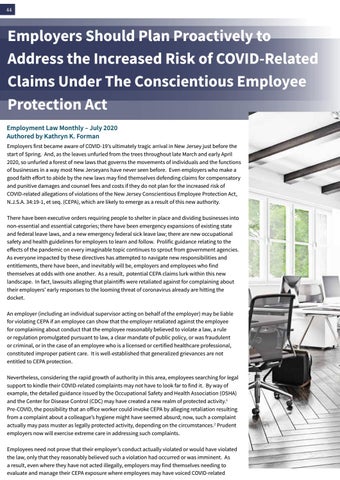44
Employers Should Plan Proactively to Address the Increased Risk of COVID-Related Claims Under The Conscientious Employee Protection Act Employment Law Monthly – July 2020 Authored by Kathryn K. Forman Employers first became aware of COVID-19’s ultimately tragic arrival in New Jersey just before the start of Spring. And, as the leaves unfurled from the trees throughout late March and early April 2020, so unfurled a forest of new laws that governs the movements of individuals and the functions of businesses in a way most New Jerseyans have never seen before. Even employers who make a good faith effort to abide by the new laws may find themselves defending claims for compensatory and punitive damages and counsel fees and costs if they do not plan for the increased risk of COVID-related allegations of violations of the New Jersey Conscientious Employee Protection Act, N.J.S.A. 34:19-1, et seq. (CEPA), which are likely to emerge as a result of this new authority. There have been executive orders requiring people to shelter in place and dividing businesses into non-essential and essential categories; there have been emergency expansions of existing state and federal leave laws, and a new emergency federal sick leave law; there are new occupational safety and health guidelines for employers to learn and follow. Prolific guidance relating to the effects of the pandemic on every imaginable topic continues to sprout from government agencies. As everyone impacted by these directives has attempted to navigate new responsibilities and entitlements, there have been, and inevitably will be, employers and employees who find themselves at odds with one another. As a result, potential CEPA claims lurk within this new landscape. In fact, lawsuits alleging that plaintiffs were retaliated against for complaining about their employers’ early responses to the looming threat of coronavirus already are hitting the docket. An employer (including an individual supervisor acting on behalf of the employer) may be liable for violating CEPA if an employee can show that the employer retaliated against the employee for complaining about conduct that the employee reasonably believed to violate a law, a rule or regulation promulgated pursuant to law, a clear mandate of public policy, or was fraudulent or criminal, or in the case of an employee who is a licensed or certified healthcare professional, constituted improper patient care. It is well-established that generalized grievances are not entitled to CEPA protection. Nevertheless, considering the rapid growth of authority in this area, employees searching for legal support to kindle their COVID-related complaints may not have to look far to find it. By way of example, the detailed guidance issued by the Occupational Safety and Health Association (OSHA) and the Center for Disease Control (CDC) may have created a new realm of protected activity.1 Pre-COVID, the possibility that an office worker could invoke CEPA by alleging retaliation resulting from a complaint about a colleague’s hygiene might have seemed absurd; now, such a complaint actually may pass muster as legally protected activity, depending on the circumstances.2 Prudent employers now will exercise extreme care in addressing such complaints. Employees need not prove that their employer’s conduct actually violated or would have violated the law, only that they reasonably believed such a violation had occurred or was imminent. As a result, even where they have not acted illegally, employers may find themselves needing to evaluate and manage their CEPA exposure where employees may have voiced COVID-related

















